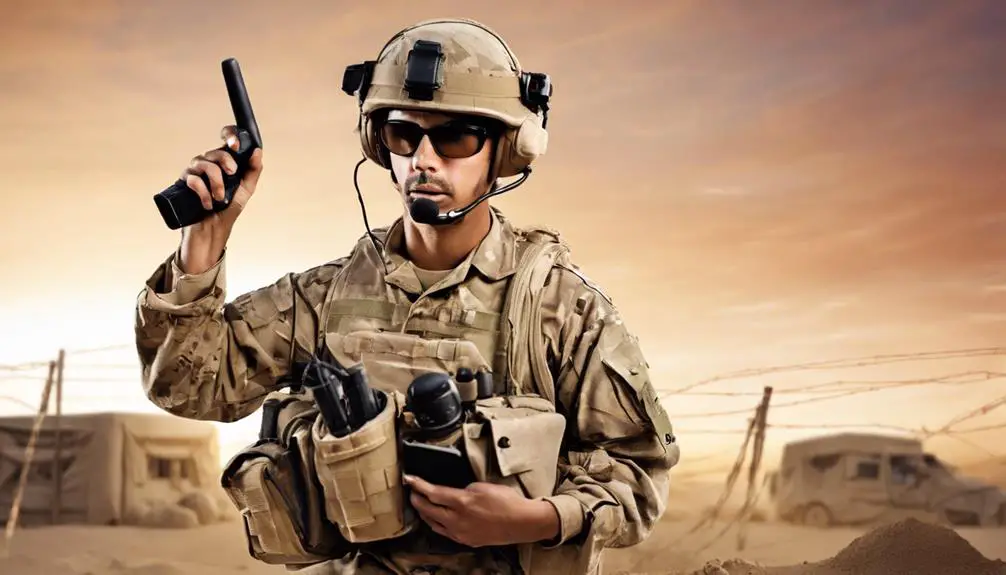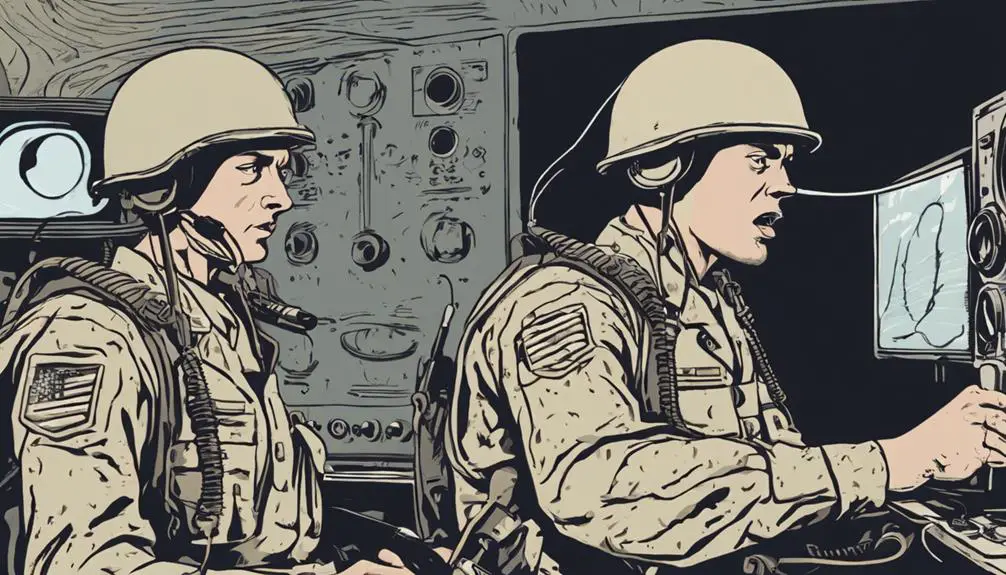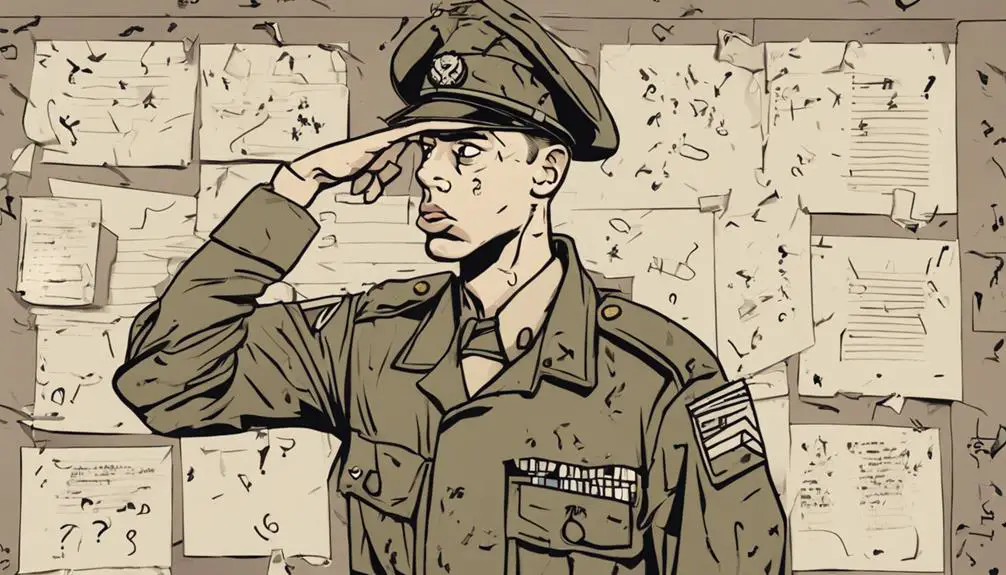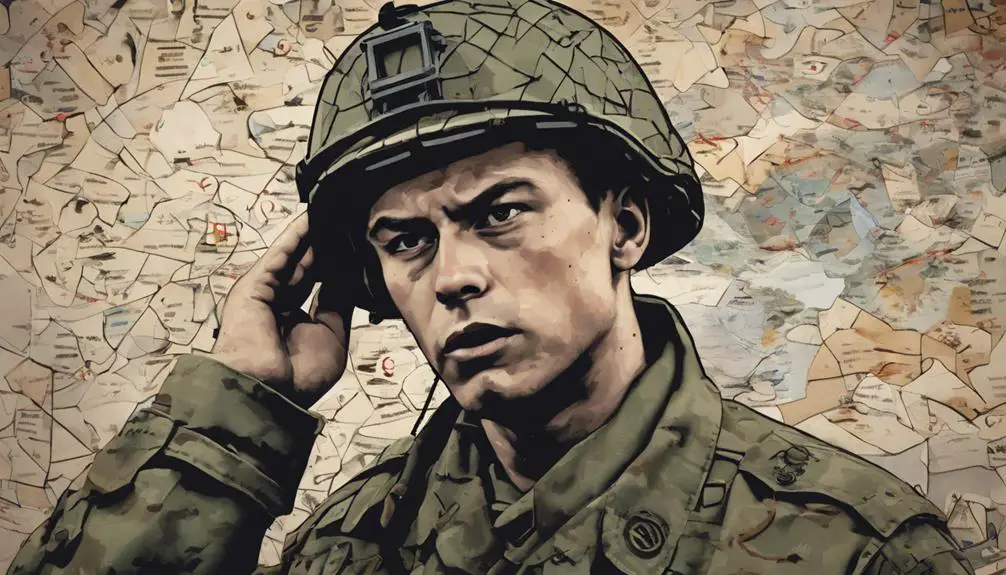In high-stress military environments, clear communication is key. When you're unsure about an order or instruction, it's important to speak up and seek clarification. That's where 'Say That Again Sir' comes in – it's a common military phrase used to ask for repetition or clarification. Don't be afraid to use it; it's an essential part of ensuring you understand the situation correctly. Miscommunication can have serious consequences, so taking the time to clarify is necessary. By using this phrase, you're being proactive and professional, and it's the first step in getting the clarity you need to get the job done safely and effectively. Now, learn how to take it to the next level.
Lost in Translation

When you're thrown into a military environment, you're often bombarded with unfamiliar acronyms, jargon, and slang that can leave you feeling like you're stuck in a never-ending game of telephone. It's overwhelming, and you're not alone in feeling lost in translation. Cultural barriers and language gaps can make it difficult to understand the nuances of military communication. You might find yourself struggling to keep up with conversations, missing important information, or worse, misinterpreting orders.
To add to the confusion, military personnel often use colloquialisms and idioms that are unique to their branch or unit. These language gaps can be particularly challenging for international personnel or those who are non-native English speakers. It's crucial to recognize that these cultural barriers can lead to misunderstandings, errors, and even safety risks. As you navigate this unfamiliar terrain, it's important to ask questions, clarify doubts, and seek guidance from more experienced personnel. By being proactive and acknowledging these language gaps, you can overcome the obstacles and become a more effective team member.
Radio Check Please

As you work to bridge the language gaps, you'll need to fine-tune your communication skills, starting with one of the most critical aspects of military communication: radio protocol. Effective radio communication is vital in high-stress situations, and it's crucial to get it right. That's where 'Radio Check Please' comes in – a phrase used to confirm that your radio is functioning correctly and that your message is being received clearly.
In a tactical environment, clear communication can be a matter of life and death. That's why radio etiquette is paramount. When transmitting, use tactical lingo to convey your message concisely and accurately. Avoid using slang or jargon that may be unfamiliar to others. Instead, stick to standardized radio protocols and terminology to make sure that your message is understood correctly.
Repeat Back to Me

To guarantee clear understanding, you'll often hear 'Repeat Back to Me' over the radio, a phrase that serves as a safeguard against miscommunication by having the receiver paraphrase the original message. This verbal confirmation guarantees that the receiver has grasped the intended meaning, eliminating any potential misunderstandings. When you're on the receiving end of an order or instruction, you'll be asked to repeat back what you've heard to confirm you've got it right. This process ensures that clear instructions are conveyed and understood accurately. By repeating back the message, you're providing verbal confirmation that you've grasped the details correctly. This simple yet effective process prevents misinterpretation and ensures that tasks are carried out as intended. So, the next time you're asked to 'Repeat Back to Me', remember it's not just a redundant exercise – it's a critical step in maintaining clear communication and avoiding costly mistakes.
Say That Again Sir

You'll often hear 'Say That Again Sir' in response to unclear or inaudible communication, a phrase that's crucial in high-stress military environments where miscommunication can have serious consequences. When you're in the thick of it, you can't afford to misunderstand orders or critical information. That's why 'Say That Again Sir' is an essential phrase that gets used frequently. It's a polite way of saying 'huh?' or 'what was that?' without appearing unsure or incompetent. When you're dealing with orders or instructions that are as clear as mud, you need to go back to basics and get clarification. 'Say That Again Sir' is a respectful way to ask for repetition, ensuring you understand the situation correctly. It's not about being slow on the uptake; it's about being professional and meticulous in high-pressure situations. By using this phrase, you're taking responsibility for your own understanding and ensuring that you're on the same page as your team.
Clarify the Situation

When unclear instructions or orders leave you scratching your head, it is vital to clarify the situation immediately. Don't risk misinterpreting critical information, which can lead to mistakes or even put lives at risk. Instead, take a proactive approach and ask clarifying questions to guarantee you understand what's expected of you. Seek additional context, such as examples or illustrations, to help illustrate the point. Remember, it's better to ask and confirm than to assume and get it wrong.
Don't be afraid to ask your superior to repeat or rephrase the instruction. You're not bothering them; you're ensuring you get it right. The military relies on clear communication, and it's your duty to seek clarity when needed. By clarifying the situation, you'll avoid confusion, reduce errors, and increase efficiency. So, don't hesitate – ask those questions and seek that additional context. Your mission depends on it.
Need More Info Over

If you're still unclear after requesting clarification, it's time to ask for more information, and 'Need More Info Over' is the military slang that gets the conversation started. This phrase is used when you need clarification on a specific topic or situation, and you're not getting the answers you need. You're not trying to be difficult, you just need more context to understand what's going on.
When you use 'Need More Info Over', you're signaling to the other person that you're not getting it, and you need them to elaborate. It's not about being lazy or not paying attention; it's about seeking elaboration to make sure you're on the same page. You're not looking for a summary or a quick fix; you need more details to grasp the situation fully.
Frequently Asked Questions
What's the Origin of Military Slang for Unclear Communications?
You're curious about the origin of military slang for unclear communications. Historically, military jargon emerged as a response to the need for efficient, concise communication on the battlefield. Over time, this terminology evolved to convey complex ideas quickly. In the early 20th century, radios and telephones became common, leading to the development of shorthand phrases like "Roger that" and "Say again?" to clarify unclear messages.
Is Military Slang Only Used in the US Military?
You might think military slang is a solely American phenomenon, but it's not. International applications of military slang exist, with different countries adopting their own terminology. Cross-cultural differences play a significant role in shaping these slang terms, reflecting unique cultural and historical contexts. While the US military has its own distinct slang, other countries, like the UK and Australia, have their own versions, adapted to their specific military needs and cultural environments.
Can Civilians Use Military Slang in Everyday Conversations?
You can definitely use military slang in everyday conversations, but be mindful of your audience. Cultural integration is key – if you're around people familiar with the terms, go for it. However, linguistic evolution is a two-way street; using military slang with civilians might confuse or alienate them. Use discretion and adapt to your surroundings to avoid misunderstandings.
Is Military Slang Limited to Radio Communications Only?
You're diving into the depths of military slang, where "huh?" meets high-stakes communication. You're wondering if military slang is limited to radio communications only. Think of it like a special forces operation – it's not just about the comms, it's about the entire mission. Military jargon seeps into informal conversations, evolving over time as new ops emerge. It's not confined to radios; it's a cultural language, adapted and adopted by those in the know.
Are There Any Military Slang Terms for Clear Communications?
When you're communicating in a high-stress environment, clarity is crucial. You want to guarantee your message is received loud and clear. That's where phrases like 'Clear as mud' come in – it's a humorous way to acknowledge unclear instructions. On the other hand, 'Roger that' is a concise way to confirm understanding. Both phrases promote clear communications, guaranteeing you're on the same page as your team. Use them to avoid confusion and stay focused on the mission at hand.







